Analysis of Effective Leadership in Early Childhood Education (ECE)
VerifiedAdded on 2021/02/21
|19
|7678
|262
Essay
AI Summary
This essay delves into the multifaceted concept of leadership within the context of early childhood education (ECE). It begins by defining "leading well" in the early years, emphasizing the alignment of culture with vision and strategy in children's centers. The essay highlights the shift towards distributed leadership and the importance of designated leaders in curriculum and pedagogy, emphasizing their role in guiding educators and shaping teaching practices. The main body explores effective leadership in childhood education, emphasizing qualities such as patience, consistency, and communication. It examines practices that characterize early childhood educational contexts, including the roles of team stakeholders, policy designers, rights advocates, and pedagogy creators. The essay discusses leadership's role in creating a learning environment where children can interact and develop essential skills. Challenges faced by children's centre leaders and strategies to resolve these challenges are also discussed, with relevant illustrations. The report also discusses what challenges leaders face in early setting, with strategies to resolve the same are highlighted under this essay, with some relevant illustrations.

Essay
Paraphrase This Document
Need a fresh take? Get an instant paraphrase of this document with our AI Paraphraser
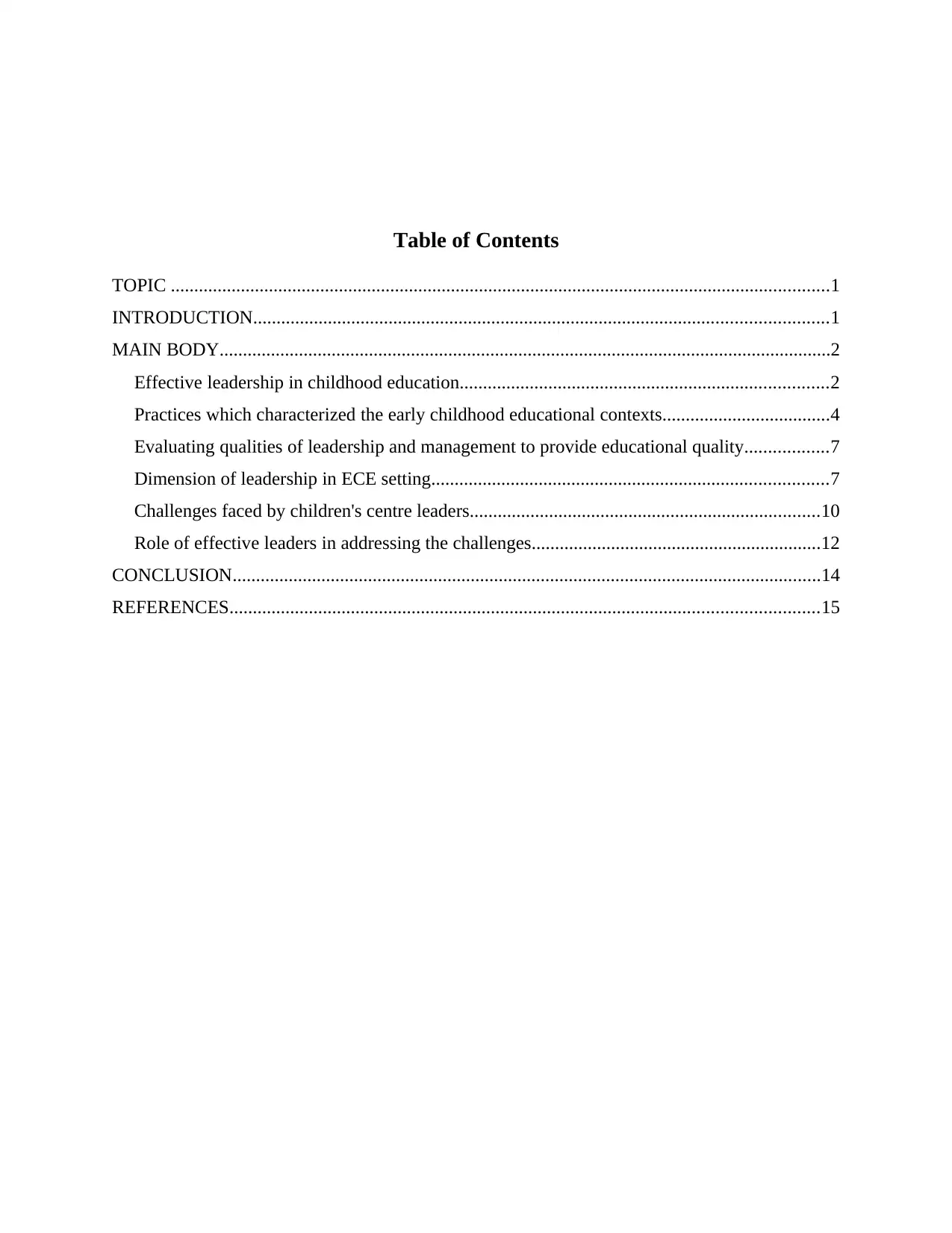
Table of Contents
TOPIC .............................................................................................................................................1
INTRODUCTION...........................................................................................................................1
MAIN BODY...................................................................................................................................2
Effective leadership in childhood education...............................................................................2
Practices which characterized the early childhood educational contexts....................................4
Evaluating qualities of leadership and management to provide educational quality..................7
Dimension of leadership in ECE setting.....................................................................................7
Challenges faced by children's centre leaders...........................................................................10
Role of effective leaders in addressing the challenges..............................................................12
CONCLUSION..............................................................................................................................14
REFERENCES..............................................................................................................................15
TOPIC .............................................................................................................................................1
INTRODUCTION...........................................................................................................................1
MAIN BODY...................................................................................................................................2
Effective leadership in childhood education...............................................................................2
Practices which characterized the early childhood educational contexts....................................4
Evaluating qualities of leadership and management to provide educational quality..................7
Dimension of leadership in ECE setting.....................................................................................7
Challenges faced by children's centre leaders...........................................................................10
Role of effective leaders in addressing the challenges..............................................................12
CONCLUSION..............................................................................................................................14
REFERENCES..............................................................................................................................15
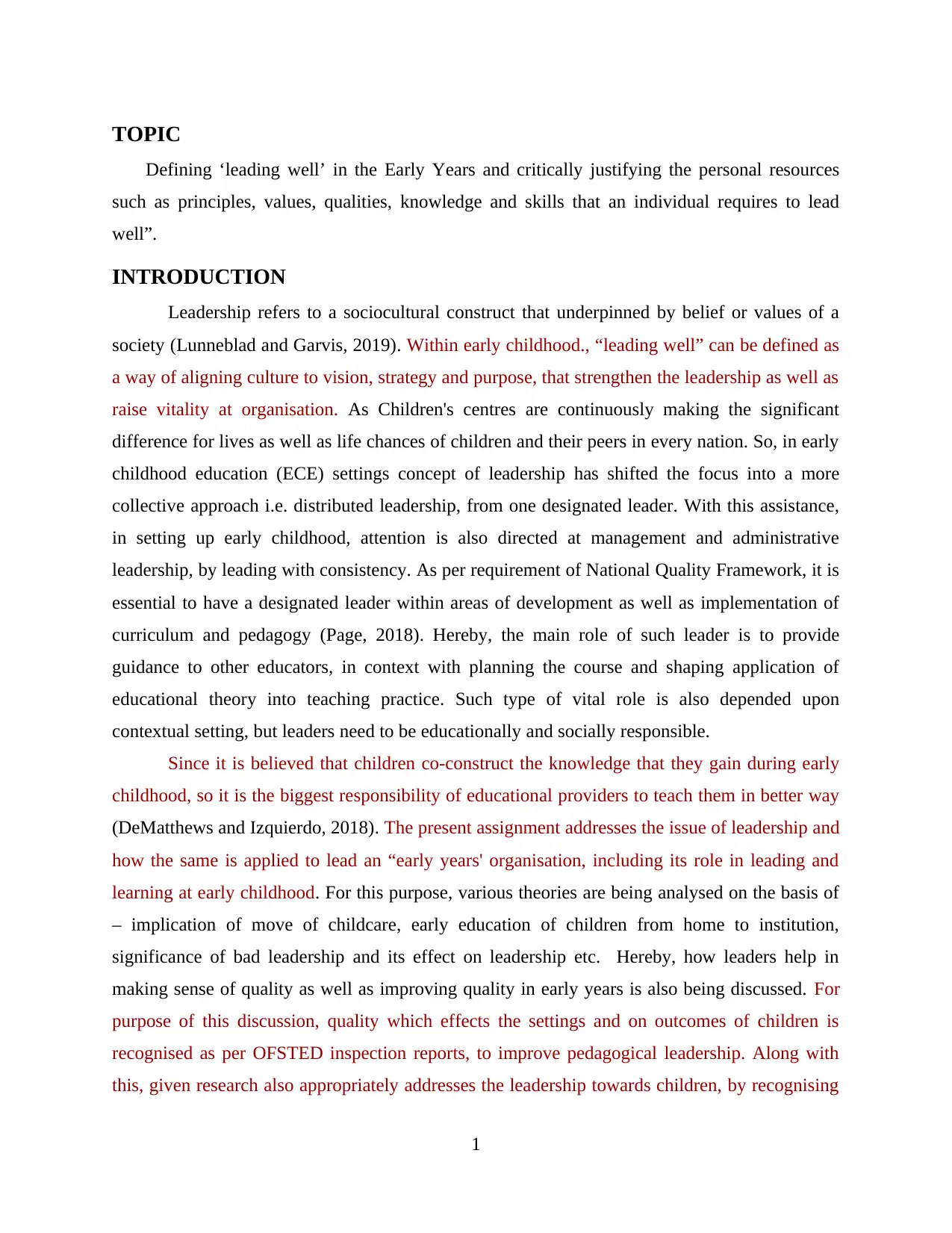
TOPIC
Defining ‘leading well’ in the Early Years and critically justifying the personal resources
such as principles, values, qualities, knowledge and skills that an individual requires to lead
well”.
INTRODUCTION
Leadership refers to a sociocultural construct that underpinned by belief or values of a
society (Lunneblad and Garvis, 2019). Within early childhood., “leading well” can be defined as
a way of aligning culture to vision, strategy and purpose, that strengthen the leadership as well as
raise vitality at organisation. As Children's centres are continuously making the significant
difference for lives as well as life chances of children and their peers in every nation. So, in early
childhood education (ECE) settings concept of leadership has shifted the focus into a more
collective approach i.e. distributed leadership, from one designated leader. With this assistance,
in setting up early childhood, attention is also directed at management and administrative
leadership, by leading with consistency. As per requirement of National Quality Framework, it is
essential to have a designated leader within areas of development as well as implementation of
curriculum and pedagogy (Page, 2018). Hereby, the main role of such leader is to provide
guidance to other educators, in context with planning the course and shaping application of
educational theory into teaching practice. Such type of vital role is also depended upon
contextual setting, but leaders need to be educationally and socially responsible.
Since it is believed that children co-construct the knowledge that they gain during early
childhood, so it is the biggest responsibility of educational providers to teach them in better way
(DeMatthews and Izquierdo, 2018). The present assignment addresses the issue of leadership and
how the same is applied to lead an “early years' organisation, including its role in leading and
learning at early childhood. For this purpose, various theories are being analysed on the basis of
– implication of move of childcare, early education of children from home to institution,
significance of bad leadership and its effect on leadership etc. Hereby, how leaders help in
making sense of quality as well as improving quality in early years is also being discussed. For
purpose of this discussion, quality which effects the settings and on outcomes of children is
recognised as per OFSTED inspection reports, to improve pedagogical leadership. Along with
this, given research also appropriately addresses the leadership towards children, by recognising
1
Defining ‘leading well’ in the Early Years and critically justifying the personal resources
such as principles, values, qualities, knowledge and skills that an individual requires to lead
well”.
INTRODUCTION
Leadership refers to a sociocultural construct that underpinned by belief or values of a
society (Lunneblad and Garvis, 2019). Within early childhood., “leading well” can be defined as
a way of aligning culture to vision, strategy and purpose, that strengthen the leadership as well as
raise vitality at organisation. As Children's centres are continuously making the significant
difference for lives as well as life chances of children and their peers in every nation. So, in early
childhood education (ECE) settings concept of leadership has shifted the focus into a more
collective approach i.e. distributed leadership, from one designated leader. With this assistance,
in setting up early childhood, attention is also directed at management and administrative
leadership, by leading with consistency. As per requirement of National Quality Framework, it is
essential to have a designated leader within areas of development as well as implementation of
curriculum and pedagogy (Page, 2018). Hereby, the main role of such leader is to provide
guidance to other educators, in context with planning the course and shaping application of
educational theory into teaching practice. Such type of vital role is also depended upon
contextual setting, but leaders need to be educationally and socially responsible.
Since it is believed that children co-construct the knowledge that they gain during early
childhood, so it is the biggest responsibility of educational providers to teach them in better way
(DeMatthews and Izquierdo, 2018). The present assignment addresses the issue of leadership and
how the same is applied to lead an “early years' organisation, including its role in leading and
learning at early childhood. For this purpose, various theories are being analysed on the basis of
– implication of move of childcare, early education of children from home to institution,
significance of bad leadership and its effect on leadership etc. Hereby, how leaders help in
making sense of quality as well as improving quality in early years is also being discussed. For
purpose of this discussion, quality which effects the settings and on outcomes of children is
recognised as per OFSTED inspection reports, to improve pedagogical leadership. Along with
this, given research also appropriately addresses the leadership towards children, by recognising
1
⊘ This is a preview!⊘
Do you want full access?
Subscribe today to unlock all pages.

Trusted by 1+ million students worldwide
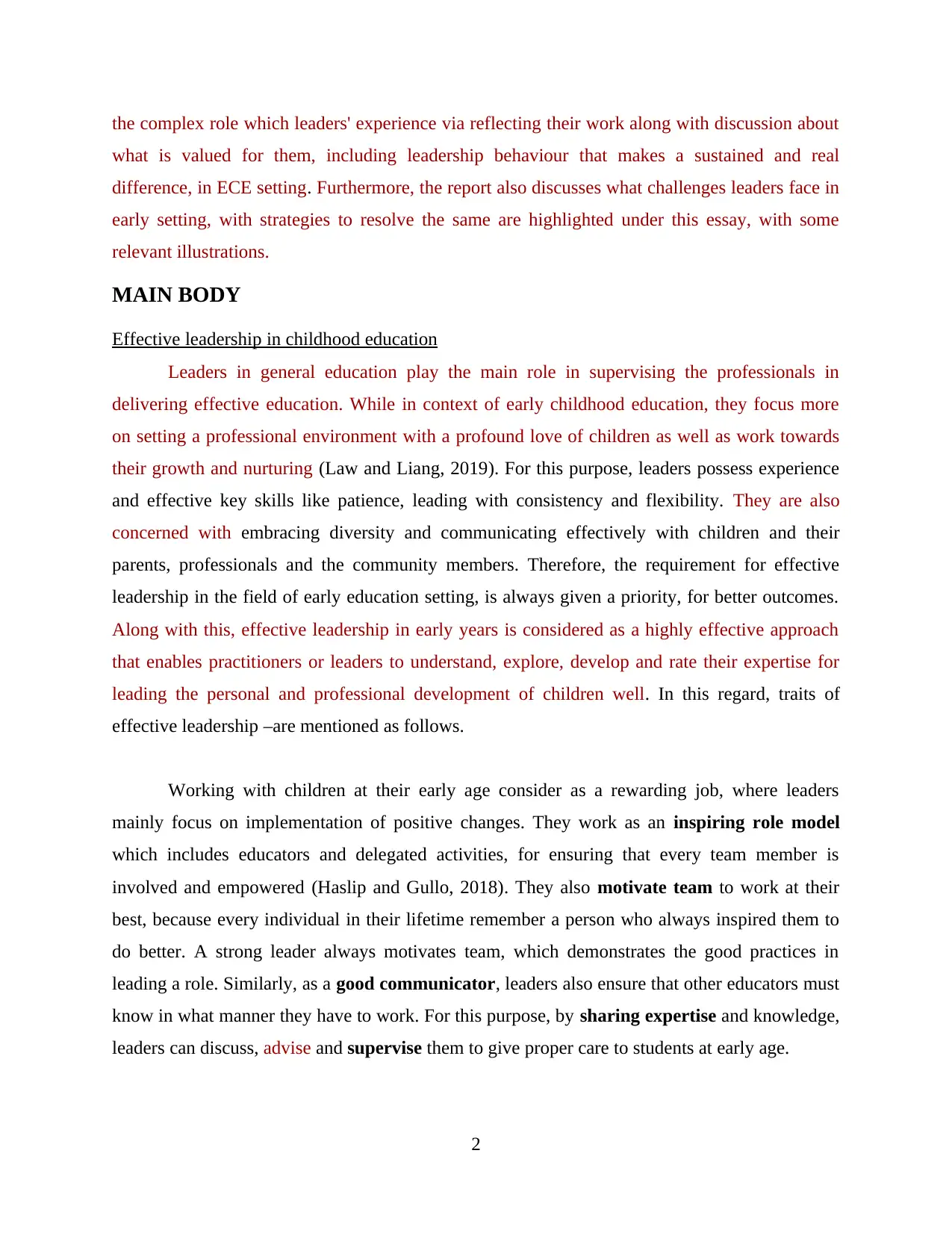
the complex role which leaders' experience via reflecting their work along with discussion about
what is valued for them, including leadership behaviour that makes a sustained and real
difference, in ECE setting. Furthermore, the report also discusses what challenges leaders face in
early setting, with strategies to resolve the same are highlighted under this essay, with some
relevant illustrations.
MAIN BODY
Effective leadership in childhood education
Leaders in general education play the main role in supervising the professionals in
delivering effective education. While in context of early childhood education, they focus more
on setting a professional environment with a profound love of children as well as work towards
their growth and nurturing (Law and Liang, 2019). For this purpose, leaders possess experience
and effective key skills like patience, leading with consistency and flexibility. They are also
concerned with embracing diversity and communicating effectively with children and their
parents, professionals and the community members. Therefore, the requirement for effective
leadership in the field of early education setting, is always given a priority, for better outcomes.
Along with this, effective leadership in early years is considered as a highly effective approach
that enables practitioners or leaders to understand, explore, develop and rate their expertise for
leading the personal and professional development of children well. In this regard, traits of
effective leadership –are mentioned as follows.
Working with children at their early age consider as a rewarding job, where leaders
mainly focus on implementation of positive changes. They work as an inspiring role model
which includes educators and delegated activities, for ensuring that every team member is
involved and empowered (Haslip and Gullo, 2018). They also motivate team to work at their
best, because every individual in their lifetime remember a person who always inspired them to
do better. A strong leader always motivates team, which demonstrates the good practices in
leading a role. Similarly, as a good communicator, leaders also ensure that other educators must
know in what manner they have to work. For this purpose, by sharing expertise and knowledge,
leaders can discuss, advise and supervise them to give proper care to students at early age.
2
what is valued for them, including leadership behaviour that makes a sustained and real
difference, in ECE setting. Furthermore, the report also discusses what challenges leaders face in
early setting, with strategies to resolve the same are highlighted under this essay, with some
relevant illustrations.
MAIN BODY
Effective leadership in childhood education
Leaders in general education play the main role in supervising the professionals in
delivering effective education. While in context of early childhood education, they focus more
on setting a professional environment with a profound love of children as well as work towards
their growth and nurturing (Law and Liang, 2019). For this purpose, leaders possess experience
and effective key skills like patience, leading with consistency and flexibility. They are also
concerned with embracing diversity and communicating effectively with children and their
parents, professionals and the community members. Therefore, the requirement for effective
leadership in the field of early education setting, is always given a priority, for better outcomes.
Along with this, effective leadership in early years is considered as a highly effective approach
that enables practitioners or leaders to understand, explore, develop and rate their expertise for
leading the personal and professional development of children well. In this regard, traits of
effective leadership –are mentioned as follows.
Working with children at their early age consider as a rewarding job, where leaders
mainly focus on implementation of positive changes. They work as an inspiring role model
which includes educators and delegated activities, for ensuring that every team member is
involved and empowered (Haslip and Gullo, 2018). They also motivate team to work at their
best, because every individual in their lifetime remember a person who always inspired them to
do better. A strong leader always motivates team, which demonstrates the good practices in
leading a role. Similarly, as a good communicator, leaders also ensure that other educators must
know in what manner they have to work. For this purpose, by sharing expertise and knowledge,
leaders can discuss, advise and supervise them to give proper care to students at early age.
2
Paraphrase This Document
Need a fresh take? Get an instant paraphrase of this document with our AI Paraphraser
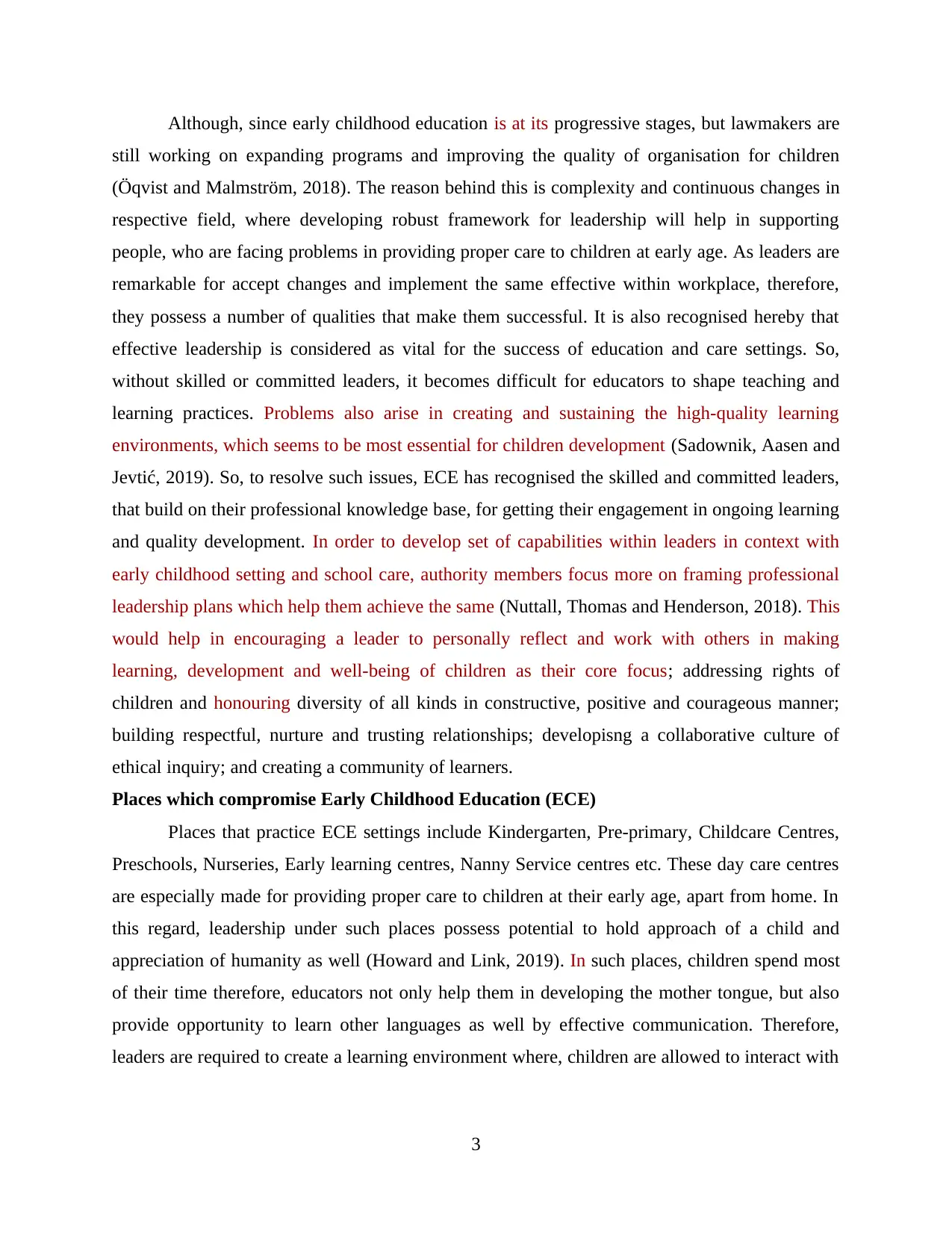
Although, since early childhood education is at its progressive stages, but lawmakers are
still working on expanding programs and improving the quality of organisation for children
(Öqvist and Malmström, 2018). The reason behind this is complexity and continuous changes in
respective field, where developing robust framework for leadership will help in supporting
people, who are facing problems in providing proper care to children at early age. As leaders are
remarkable for accept changes and implement the same effective within workplace, therefore,
they possess a number of qualities that make them successful. It is also recognised hereby that
effective leadership is considered as vital for the success of education and care settings. So,
without skilled or committed leaders, it becomes difficult for educators to shape teaching and
learning practices. Problems also arise in creating and sustaining the high-quality learning
environments, which seems to be most essential for children development (Sadownik, Aasen and
Jevtić, 2019). So, to resolve such issues, ECE has recognised the skilled and committed leaders,
that build on their professional knowledge base, for getting their engagement in ongoing learning
and quality development. In order to develop set of capabilities within leaders in context with
early childhood setting and school care, authority members focus more on framing professional
leadership plans which help them achieve the same (Nuttall, Thomas and Henderson, 2018). This
would help in encouraging a leader to personally reflect and work with others in making
learning, development and well-being of children as their core focus; addressing rights of
children and honouring diversity of all kinds in constructive, positive and courageous manner;
building respectful, nurture and trusting relationships; developisng a collaborative culture of
ethical inquiry; and creating a community of learners.
Places which compromise Early Childhood Education (ECE)
Places that practice ECE settings include Kindergarten, Pre-primary, Childcare Centres,
Preschools, Nurseries, Early learning centres, Nanny Service centres etc. These day care centres
are especially made for providing proper care to children at their early age, apart from home. In
this regard, leadership under such places possess potential to hold approach of a child and
appreciation of humanity as well (Howard and Link, 2019). In such places, children spend most
of their time therefore, educators not only help them in developing the mother tongue, but also
provide opportunity to learn other languages as well by effective communication. Therefore,
leaders are required to create a learning environment where, children are allowed to interact with
3
still working on expanding programs and improving the quality of organisation for children
(Öqvist and Malmström, 2018). The reason behind this is complexity and continuous changes in
respective field, where developing robust framework for leadership will help in supporting
people, who are facing problems in providing proper care to children at early age. As leaders are
remarkable for accept changes and implement the same effective within workplace, therefore,
they possess a number of qualities that make them successful. It is also recognised hereby that
effective leadership is considered as vital for the success of education and care settings. So,
without skilled or committed leaders, it becomes difficult for educators to shape teaching and
learning practices. Problems also arise in creating and sustaining the high-quality learning
environments, which seems to be most essential for children development (Sadownik, Aasen and
Jevtić, 2019). So, to resolve such issues, ECE has recognised the skilled and committed leaders,
that build on their professional knowledge base, for getting their engagement in ongoing learning
and quality development. In order to develop set of capabilities within leaders in context with
early childhood setting and school care, authority members focus more on framing professional
leadership plans which help them achieve the same (Nuttall, Thomas and Henderson, 2018). This
would help in encouraging a leader to personally reflect and work with others in making
learning, development and well-being of children as their core focus; addressing rights of
children and honouring diversity of all kinds in constructive, positive and courageous manner;
building respectful, nurture and trusting relationships; developisng a collaborative culture of
ethical inquiry; and creating a community of learners.
Places which compromise Early Childhood Education (ECE)
Places that practice ECE settings include Kindergarten, Pre-primary, Childcare Centres,
Preschools, Nurseries, Early learning centres, Nanny Service centres etc. These day care centres
are especially made for providing proper care to children at their early age, apart from home. In
this regard, leadership under such places possess potential to hold approach of a child and
appreciation of humanity as well (Howard and Link, 2019). In such places, children spend most
of their time therefore, educators not only help them in developing the mother tongue, but also
provide opportunity to learn other languages as well by effective communication. Therefore,
leaders are required to create a learning environment where, children are allowed to interact with
3
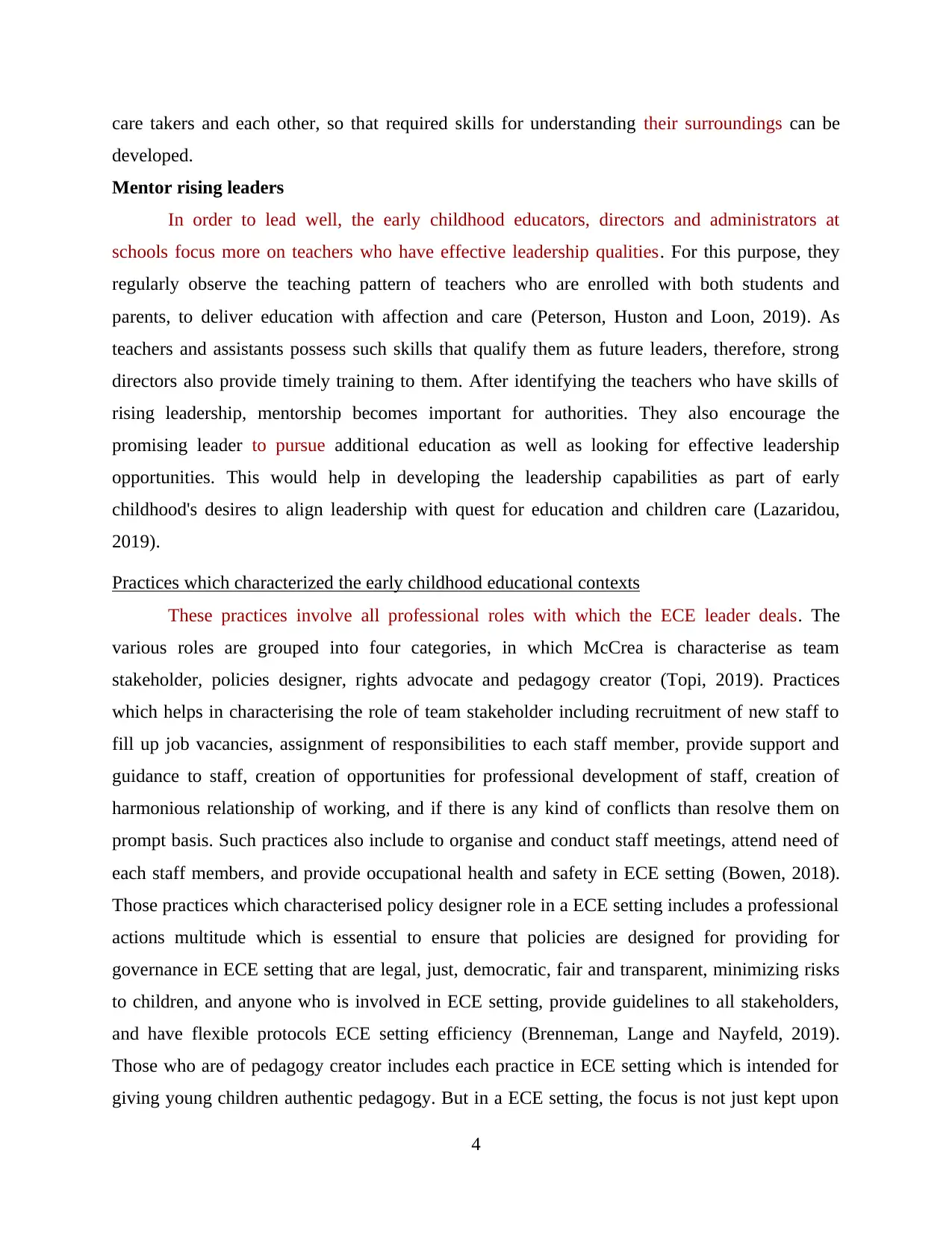
care takers and each other, so that required skills for understanding their surroundings can be
developed.
Mentor rising leaders
In order to lead well, the early childhood educators, directors and administrators at
schools focus more on teachers who have effective leadership qualities. For this purpose, they
regularly observe the teaching pattern of teachers who are enrolled with both students and
parents, to deliver education with affection and care (Peterson, Huston and Loon, 2019). As
teachers and assistants possess such skills that qualify them as future leaders, therefore, strong
directors also provide timely training to them. After identifying the teachers who have skills of
rising leadership, mentorship becomes important for authorities. They also encourage the
promising leader to pursue additional education as well as looking for effective leadership
opportunities. This would help in developing the leadership capabilities as part of early
childhood's desires to align leadership with quest for education and children care (Lazaridou,
2019).
Practices which characterized the early childhood educational contexts
These practices involve all professional roles with which the ECE leader deals. The
various roles are grouped into four categories, in which McCrea is characterise as team
stakeholder, policies designer, rights advocate and pedagogy creator (Topi, 2019). Practices
which helps in characterising the role of team stakeholder including recruitment of new staff to
fill up job vacancies, assignment of responsibilities to each staff member, provide support and
guidance to staff, creation of opportunities for professional development of staff, creation of
harmonious relationship of working, and if there is any kind of conflicts than resolve them on
prompt basis. Such practices also include to organise and conduct staff meetings, attend need of
each staff members, and provide occupational health and safety in ECE setting (Bowen, 2018).
Those practices which characterised policy designer role in a ECE setting includes a professional
actions multitude which is essential to ensure that policies are designed for providing for
governance in ECE setting that are legal, just, democratic, fair and transparent, minimizing risks
to children, and anyone who is involved in ECE setting, provide guidelines to all stakeholders,
and have flexible protocols ECE setting efficiency (Brenneman, Lange and Nayfeld, 2019).
Those who are of pedagogy creator includes each practice in ECE setting which is intended for
giving young children authentic pedagogy. But in a ECE setting, the focus is not just kept upon
4
developed.
Mentor rising leaders
In order to lead well, the early childhood educators, directors and administrators at
schools focus more on teachers who have effective leadership qualities. For this purpose, they
regularly observe the teaching pattern of teachers who are enrolled with both students and
parents, to deliver education with affection and care (Peterson, Huston and Loon, 2019). As
teachers and assistants possess such skills that qualify them as future leaders, therefore, strong
directors also provide timely training to them. After identifying the teachers who have skills of
rising leadership, mentorship becomes important for authorities. They also encourage the
promising leader to pursue additional education as well as looking for effective leadership
opportunities. This would help in developing the leadership capabilities as part of early
childhood's desires to align leadership with quest for education and children care (Lazaridou,
2019).
Practices which characterized the early childhood educational contexts
These practices involve all professional roles with which the ECE leader deals. The
various roles are grouped into four categories, in which McCrea is characterise as team
stakeholder, policies designer, rights advocate and pedagogy creator (Topi, 2019). Practices
which helps in characterising the role of team stakeholder including recruitment of new staff to
fill up job vacancies, assignment of responsibilities to each staff member, provide support and
guidance to staff, creation of opportunities for professional development of staff, creation of
harmonious relationship of working, and if there is any kind of conflicts than resolve them on
prompt basis. Such practices also include to organise and conduct staff meetings, attend need of
each staff members, and provide occupational health and safety in ECE setting (Bowen, 2018).
Those practices which characterised policy designer role in a ECE setting includes a professional
actions multitude which is essential to ensure that policies are designed for providing for
governance in ECE setting that are legal, just, democratic, fair and transparent, minimizing risks
to children, and anyone who is involved in ECE setting, provide guidelines to all stakeholders,
and have flexible protocols ECE setting efficiency (Brenneman, Lange and Nayfeld, 2019).
Those who are of pedagogy creator includes each practice in ECE setting which is intended for
giving young children authentic pedagogy. But in a ECE setting, the focus is not just kept upon
4
⊘ This is a preview!⊘
Do you want full access?
Subscribe today to unlock all pages.

Trusted by 1+ million students worldwide
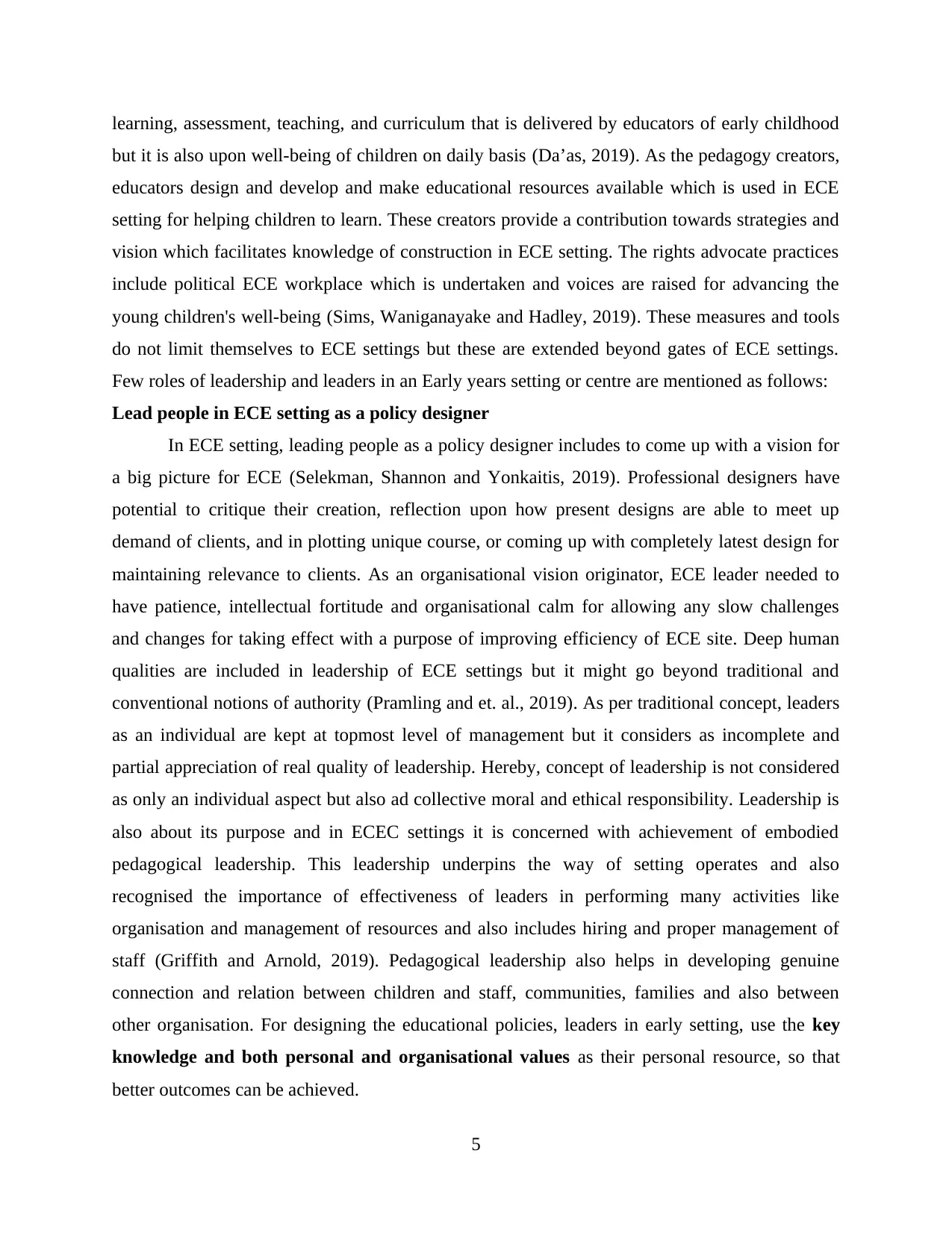
learning, assessment, teaching, and curriculum that is delivered by educators of early childhood
but it is also upon well-being of children on daily basis (Da’as, 2019). As the pedagogy creators,
educators design and develop and make educational resources available which is used in ECE
setting for helping children to learn. These creators provide a contribution towards strategies and
vision which facilitates knowledge of construction in ECE setting. The rights advocate practices
include political ECE workplace which is undertaken and voices are raised for advancing the
young children's well-being (Sims, Waniganayake and Hadley, 2019). These measures and tools
do not limit themselves to ECE settings but these are extended beyond gates of ECE settings.
Few roles of leadership and leaders in an Early years setting or centre are mentioned as follows:
Lead people in ECE setting as a policy designer
In ECE setting, leading people as a policy designer includes to come up with a vision for
a big picture for ECE (Selekman, Shannon and Yonkaitis, 2019). Professional designers have
potential to critique their creation, reflection upon how present designs are able to meet up
demand of clients, and in plotting unique course, or coming up with completely latest design for
maintaining relevance to clients. As an organisational vision originator, ECE leader needed to
have patience, intellectual fortitude and organisational calm for allowing any slow challenges
and changes for taking effect with a purpose of improving efficiency of ECE site. Deep human
qualities are included in leadership of ECE settings but it might go beyond traditional and
conventional notions of authority (Pramling and et. al., 2019). As per traditional concept, leaders
as an individual are kept at topmost level of management but it considers as incomplete and
partial appreciation of real quality of leadership. Hereby, concept of leadership is not considered
as only an individual aspect but also ad collective moral and ethical responsibility. Leadership is
also about its purpose and in ECEC settings it is concerned with achievement of embodied
pedagogical leadership. This leadership underpins the way of setting operates and also
recognised the importance of effectiveness of leaders in performing many activities like
organisation and management of resources and also includes hiring and proper management of
staff (Griffith and Arnold, 2019). Pedagogical leadership also helps in developing genuine
connection and relation between children and staff, communities, families and also between
other organisation. For designing the educational policies, leaders in early setting, use the key
knowledge and both personal and organisational values as their personal resource, so that
better outcomes can be achieved.
5
but it is also upon well-being of children on daily basis (Da’as, 2019). As the pedagogy creators,
educators design and develop and make educational resources available which is used in ECE
setting for helping children to learn. These creators provide a contribution towards strategies and
vision which facilitates knowledge of construction in ECE setting. The rights advocate practices
include political ECE workplace which is undertaken and voices are raised for advancing the
young children's well-being (Sims, Waniganayake and Hadley, 2019). These measures and tools
do not limit themselves to ECE settings but these are extended beyond gates of ECE settings.
Few roles of leadership and leaders in an Early years setting or centre are mentioned as follows:
Lead people in ECE setting as a policy designer
In ECE setting, leading people as a policy designer includes to come up with a vision for
a big picture for ECE (Selekman, Shannon and Yonkaitis, 2019). Professional designers have
potential to critique their creation, reflection upon how present designs are able to meet up
demand of clients, and in plotting unique course, or coming up with completely latest design for
maintaining relevance to clients. As an organisational vision originator, ECE leader needed to
have patience, intellectual fortitude and organisational calm for allowing any slow challenges
and changes for taking effect with a purpose of improving efficiency of ECE site. Deep human
qualities are included in leadership of ECE settings but it might go beyond traditional and
conventional notions of authority (Pramling and et. al., 2019). As per traditional concept, leaders
as an individual are kept at topmost level of management but it considers as incomplete and
partial appreciation of real quality of leadership. Hereby, concept of leadership is not considered
as only an individual aspect but also ad collective moral and ethical responsibility. Leadership is
also about its purpose and in ECEC settings it is concerned with achievement of embodied
pedagogical leadership. This leadership underpins the way of setting operates and also
recognised the importance of effectiveness of leaders in performing many activities like
organisation and management of resources and also includes hiring and proper management of
staff (Griffith and Arnold, 2019). Pedagogical leadership also helps in developing genuine
connection and relation between children and staff, communities, families and also between
other organisation. For designing the educational policies, leaders in early setting, use the key
knowledge and both personal and organisational values as their personal resource, so that
better outcomes can be achieved.
5
Paraphrase This Document
Need a fresh take? Get an instant paraphrase of this document with our AI Paraphraser
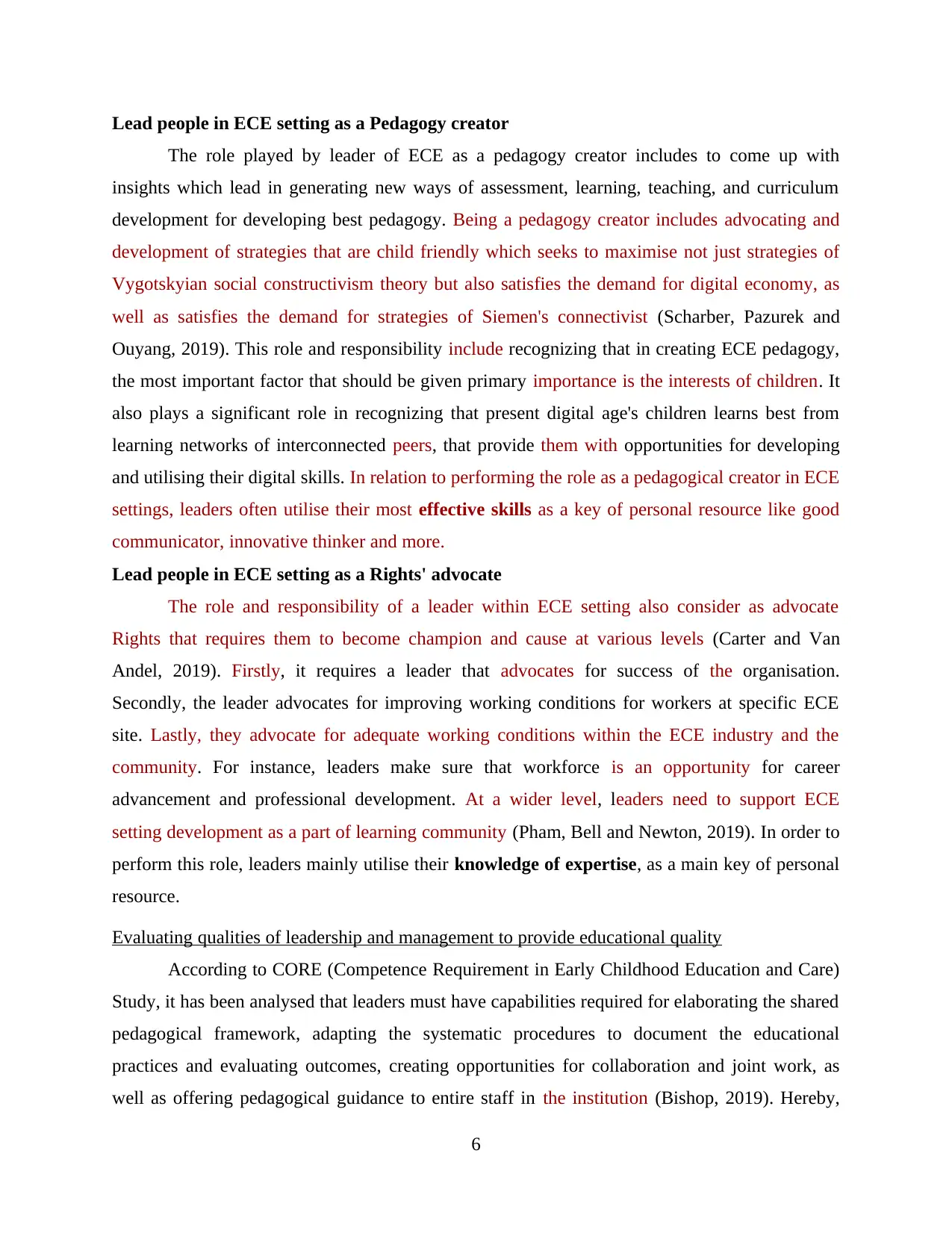
Lead people in ECE setting as a Pedagogy creator
The role played by leader of ECE as a pedagogy creator includes to come up with
insights which lead in generating new ways of assessment, learning, teaching, and curriculum
development for developing best pedagogy. Being a pedagogy creator includes advocating and
development of strategies that are child friendly which seeks to maximise not just strategies of
Vygotskyian social constructivism theory but also satisfies the demand for digital economy, as
well as satisfies the demand for strategies of Siemen's connectivist (Scharber, Pazurek and
Ouyang, 2019). This role and responsibility include recognizing that in creating ECE pedagogy,
the most important factor that should be given primary importance is the interests of children. It
also plays a significant role in recognizing that present digital age's children learns best from
learning networks of interconnected peers, that provide them with opportunities for developing
and utilising their digital skills. In relation to performing the role as a pedagogical creator in ECE
settings, leaders often utilise their most effective skills as a key of personal resource like good
communicator, innovative thinker and more.
Lead people in ECE setting as a Rights' advocate
The role and responsibility of a leader within ECE setting also consider as advocate
Rights that requires them to become champion and cause at various levels (Carter and Van
Andel, 2019). Firstly, it requires a leader that advocates for success of the organisation.
Secondly, the leader advocates for improving working conditions for workers at specific ECE
site. Lastly, they advocate for adequate working conditions within the ECE industry and the
community. For instance, leaders make sure that workforce is an opportunity for career
advancement and professional development. At a wider level, leaders need to support ECE
setting development as a part of learning community (Pham, Bell and Newton, 2019). In order to
perform this role, leaders mainly utilise their knowledge of expertise, as a main key of personal
resource.
Evaluating qualities of leadership and management to provide educational quality
According to CORE (Competence Requirement in Early Childhood Education and Care)
Study, it has been analysed that leaders must have capabilities required for elaborating the shared
pedagogical framework, adapting the systematic procedures to document the educational
practices and evaluating outcomes, creating opportunities for collaboration and joint work, as
well as offering pedagogical guidance to entire staff in the institution (Bishop, 2019). Hereby,
6
The role played by leader of ECE as a pedagogy creator includes to come up with
insights which lead in generating new ways of assessment, learning, teaching, and curriculum
development for developing best pedagogy. Being a pedagogy creator includes advocating and
development of strategies that are child friendly which seeks to maximise not just strategies of
Vygotskyian social constructivism theory but also satisfies the demand for digital economy, as
well as satisfies the demand for strategies of Siemen's connectivist (Scharber, Pazurek and
Ouyang, 2019). This role and responsibility include recognizing that in creating ECE pedagogy,
the most important factor that should be given primary importance is the interests of children. It
also plays a significant role in recognizing that present digital age's children learns best from
learning networks of interconnected peers, that provide them with opportunities for developing
and utilising their digital skills. In relation to performing the role as a pedagogical creator in ECE
settings, leaders often utilise their most effective skills as a key of personal resource like good
communicator, innovative thinker and more.
Lead people in ECE setting as a Rights' advocate
The role and responsibility of a leader within ECE setting also consider as advocate
Rights that requires them to become champion and cause at various levels (Carter and Van
Andel, 2019). Firstly, it requires a leader that advocates for success of the organisation.
Secondly, the leader advocates for improving working conditions for workers at specific ECE
site. Lastly, they advocate for adequate working conditions within the ECE industry and the
community. For instance, leaders make sure that workforce is an opportunity for career
advancement and professional development. At a wider level, leaders need to support ECE
setting development as a part of learning community (Pham, Bell and Newton, 2019). In order to
perform this role, leaders mainly utilise their knowledge of expertise, as a main key of personal
resource.
Evaluating qualities of leadership and management to provide educational quality
According to CORE (Competence Requirement in Early Childhood Education and Care)
Study, it has been analysed that leaders must have capabilities required for elaborating the shared
pedagogical framework, adapting the systematic procedures to document the educational
practices and evaluating outcomes, creating opportunities for collaboration and joint work, as
well as offering pedagogical guidance to entire staff in the institution (Bishop, 2019). Hereby,
6
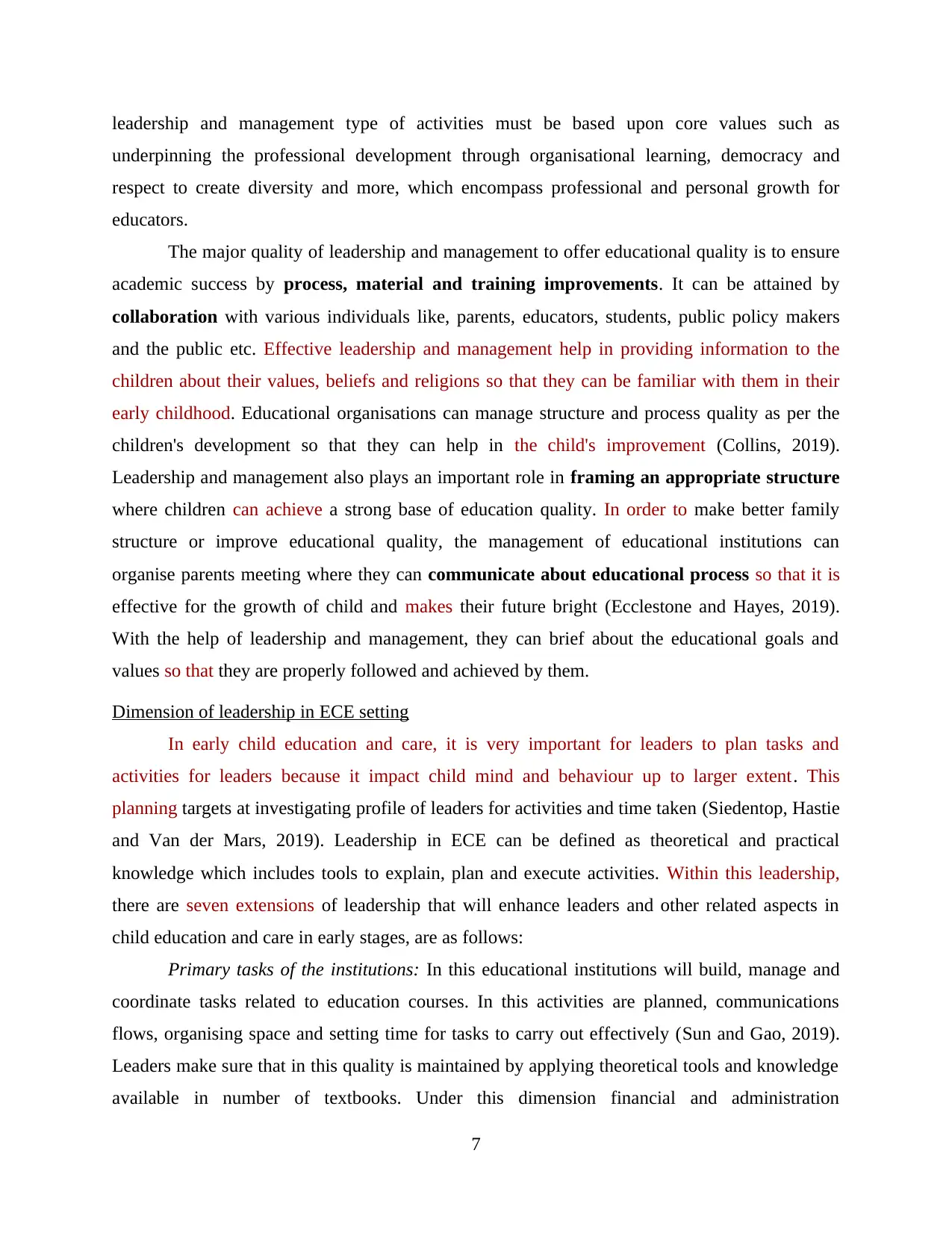
leadership and management type of activities must be based upon core values such as
underpinning the professional development through organisational learning, democracy and
respect to create diversity and more, which encompass professional and personal growth for
educators.
The major quality of leadership and management to offer educational quality is to ensure
academic success by process, material and training improvements. It can be attained by
collaboration with various individuals like, parents, educators, students, public policy makers
and the public etc. Effective leadership and management help in providing information to the
children about their values, beliefs and religions so that they can be familiar with them in their
early childhood. Educational organisations can manage structure and process quality as per the
children's development so that they can help in the child's improvement (Collins, 2019).
Leadership and management also plays an important role in framing an appropriate structure
where children can achieve a strong base of education quality. In order to make better family
structure or improve educational quality, the management of educational institutions can
organise parents meeting where they can communicate about educational process so that it is
effective for the growth of child and makes their future bright (Ecclestone and Hayes, 2019).
With the help of leadership and management, they can brief about the educational goals and
values so that they are properly followed and achieved by them.
Dimension of leadership in ECE setting
In early child education and care, it is very important for leaders to plan tasks and
activities for leaders because it impact child mind and behaviour up to larger extent. This
planning targets at investigating profile of leaders for activities and time taken (Siedentop, Hastie
and Van der Mars, 2019). Leadership in ECE can be defined as theoretical and practical
knowledge which includes tools to explain, plan and execute activities. Within this leadership,
there are seven extensions of leadership that will enhance leaders and other related aspects in
child education and care in early stages, are as follows:
Primary tasks of the institutions: In this educational institutions will build, manage and
coordinate tasks related to education courses. In this activities are planned, communications
flows, organising space and setting time for tasks to carry out effectively (Sun and Gao, 2019).
Leaders make sure that in this quality is maintained by applying theoretical tools and knowledge
available in number of textbooks. Under this dimension financial and administration
7
underpinning the professional development through organisational learning, democracy and
respect to create diversity and more, which encompass professional and personal growth for
educators.
The major quality of leadership and management to offer educational quality is to ensure
academic success by process, material and training improvements. It can be attained by
collaboration with various individuals like, parents, educators, students, public policy makers
and the public etc. Effective leadership and management help in providing information to the
children about their values, beliefs and religions so that they can be familiar with them in their
early childhood. Educational organisations can manage structure and process quality as per the
children's development so that they can help in the child's improvement (Collins, 2019).
Leadership and management also plays an important role in framing an appropriate structure
where children can achieve a strong base of education quality. In order to make better family
structure or improve educational quality, the management of educational institutions can
organise parents meeting where they can communicate about educational process so that it is
effective for the growth of child and makes their future bright (Ecclestone and Hayes, 2019).
With the help of leadership and management, they can brief about the educational goals and
values so that they are properly followed and achieved by them.
Dimension of leadership in ECE setting
In early child education and care, it is very important for leaders to plan tasks and
activities for leaders because it impact child mind and behaviour up to larger extent. This
planning targets at investigating profile of leaders for activities and time taken (Siedentop, Hastie
and Van der Mars, 2019). Leadership in ECE can be defined as theoretical and practical
knowledge which includes tools to explain, plan and execute activities. Within this leadership,
there are seven extensions of leadership that will enhance leaders and other related aspects in
child education and care in early stages, are as follows:
Primary tasks of the institutions: In this educational institutions will build, manage and
coordinate tasks related to education courses. In this activities are planned, communications
flows, organising space and setting time for tasks to carry out effectively (Sun and Gao, 2019).
Leaders make sure that in this quality is maintained by applying theoretical tools and knowledge
available in number of textbooks. Under this dimension financial and administration
7
⊘ This is a preview!⊘
Do you want full access?
Subscribe today to unlock all pages.

Trusted by 1+ million students worldwide
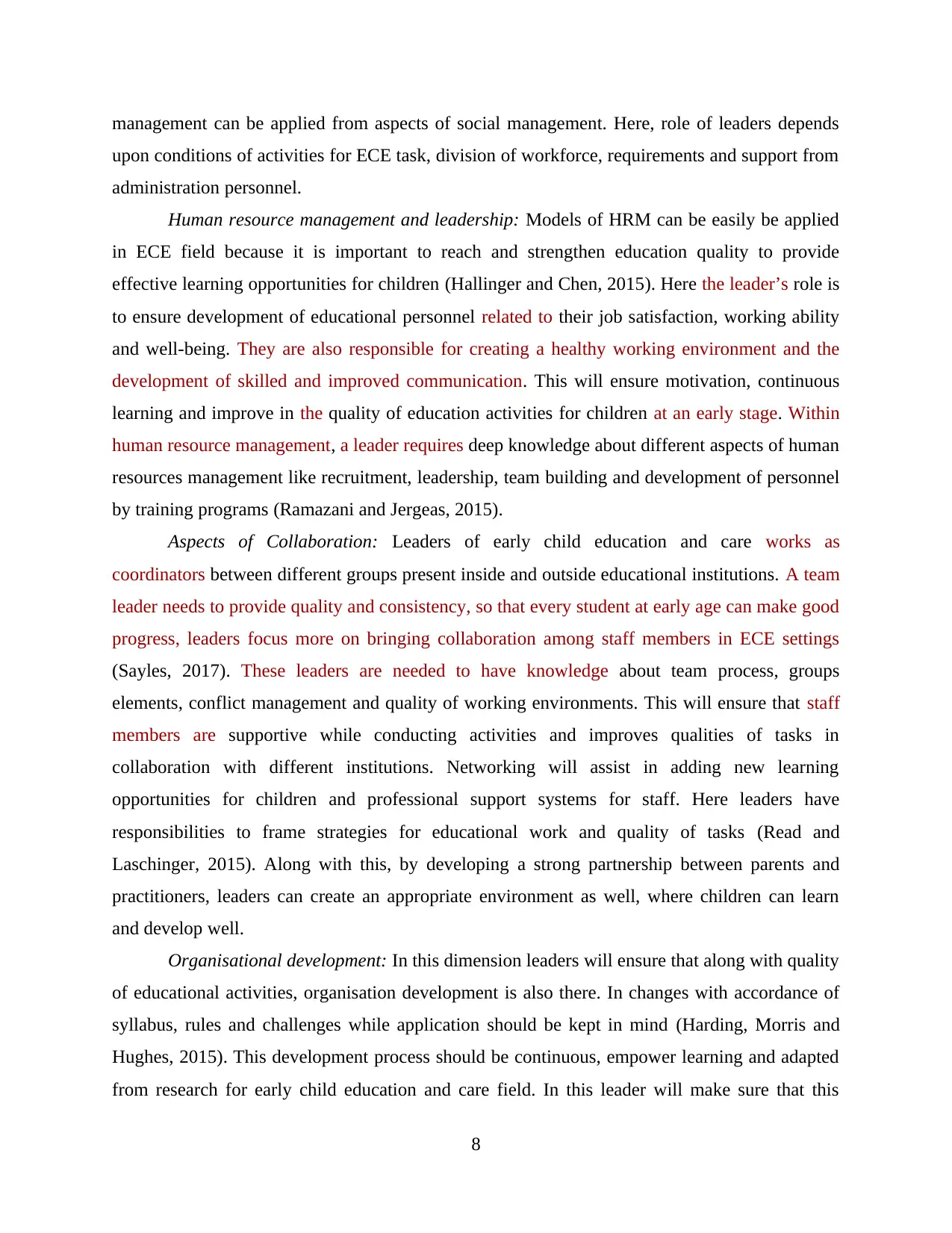
management can be applied from aspects of social management. Here, role of leaders depends
upon conditions of activities for ECE task, division of workforce, requirements and support from
administration personnel.
Human resource management and leadership: Models of HRM can be easily be applied
in ECE field because it is important to reach and strengthen education quality to provide
effective learning opportunities for children (Hallinger and Chen, 2015). Here the leader’s role is
to ensure development of educational personnel related to their job satisfaction, working ability
and well-being. They are also responsible for creating a healthy working environment and the
development of skilled and improved communication. This will ensure motivation, continuous
learning and improve in the quality of education activities for children at an early stage. Within
human resource management, a leader requires deep knowledge about different aspects of human
resources management like recruitment, leadership, team building and development of personnel
by training programs (Ramazani and Jergeas, 2015).
Aspects of Collaboration: Leaders of early child education and care works as
coordinators between different groups present inside and outside educational institutions. A team
leader needs to provide quality and consistency, so that every student at early age can make good
progress, leaders focus more on bringing collaboration among staff members in ECE settings
(Sayles, 2017). These leaders are needed to have knowledge about team process, groups
elements, conflict management and quality of working environments. This will ensure that staff
members are supportive while conducting activities and improves qualities of tasks in
collaboration with different institutions. Networking will assist in adding new learning
opportunities for children and professional support systems for staff. Here leaders have
responsibilities to frame strategies for educational work and quality of tasks (Read and
Laschinger, 2015). Along with this, by developing a strong partnership between parents and
practitioners, leaders can create an appropriate environment as well, where children can learn
and develop well.
Organisational development: In this dimension leaders will ensure that along with quality
of educational activities, organisation development is also there. In changes with accordance of
syllabus, rules and challenges while application should be kept in mind (Harding, Morris and
Hughes, 2015). This development process should be continuous, empower learning and adapted
from research for early child education and care field. In this leader will make sure that this
8
upon conditions of activities for ECE task, division of workforce, requirements and support from
administration personnel.
Human resource management and leadership: Models of HRM can be easily be applied
in ECE field because it is important to reach and strengthen education quality to provide
effective learning opportunities for children (Hallinger and Chen, 2015). Here the leader’s role is
to ensure development of educational personnel related to their job satisfaction, working ability
and well-being. They are also responsible for creating a healthy working environment and the
development of skilled and improved communication. This will ensure motivation, continuous
learning and improve in the quality of education activities for children at an early stage. Within
human resource management, a leader requires deep knowledge about different aspects of human
resources management like recruitment, leadership, team building and development of personnel
by training programs (Ramazani and Jergeas, 2015).
Aspects of Collaboration: Leaders of early child education and care works as
coordinators between different groups present inside and outside educational institutions. A team
leader needs to provide quality and consistency, so that every student at early age can make good
progress, leaders focus more on bringing collaboration among staff members in ECE settings
(Sayles, 2017). These leaders are needed to have knowledge about team process, groups
elements, conflict management and quality of working environments. This will ensure that staff
members are supportive while conducting activities and improves qualities of tasks in
collaboration with different institutions. Networking will assist in adding new learning
opportunities for children and professional support systems for staff. Here leaders have
responsibilities to frame strategies for educational work and quality of tasks (Read and
Laschinger, 2015). Along with this, by developing a strong partnership between parents and
practitioners, leaders can create an appropriate environment as well, where children can learn
and develop well.
Organisational development: In this dimension leaders will ensure that along with quality
of educational activities, organisation development is also there. In changes with accordance of
syllabus, rules and challenges while application should be kept in mind (Harding, Morris and
Hughes, 2015). This development process should be continuous, empower learning and adapted
from research for early child education and care field. In this leader will make sure that this
8
Paraphrase This Document
Need a fresh take? Get an instant paraphrase of this document with our AI Paraphraser
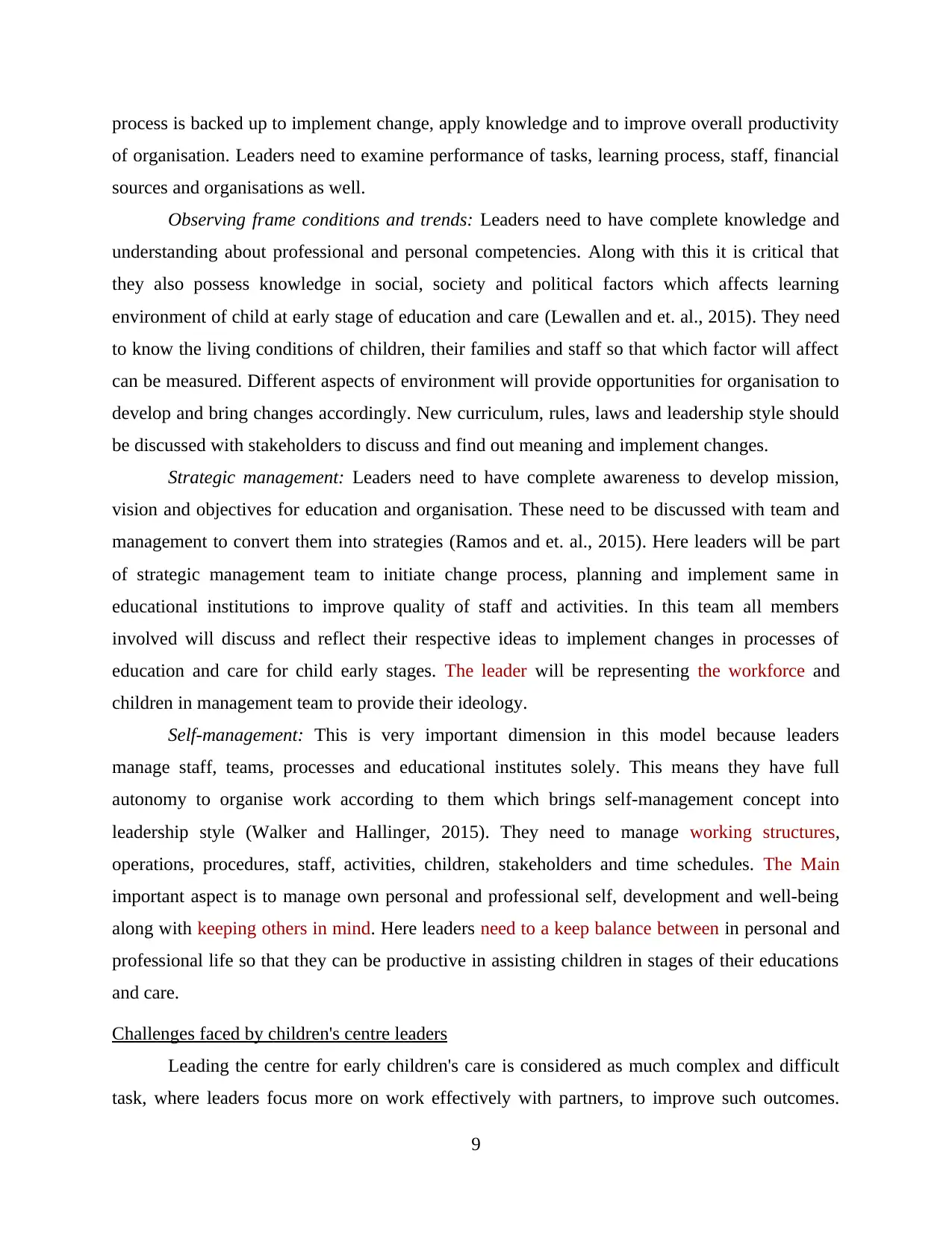
process is backed up to implement change, apply knowledge and to improve overall productivity
of organisation. Leaders need to examine performance of tasks, learning process, staff, financial
sources and organisations as well.
Observing frame conditions and trends: Leaders need to have complete knowledge and
understanding about professional and personal competencies. Along with this it is critical that
they also possess knowledge in social, society and political factors which affects learning
environment of child at early stage of education and care (Lewallen and et. al., 2015). They need
to know the living conditions of children, their families and staff so that which factor will affect
can be measured. Different aspects of environment will provide opportunities for organisation to
develop and bring changes accordingly. New curriculum, rules, laws and leadership style should
be discussed with stakeholders to discuss and find out meaning and implement changes.
Strategic management: Leaders need to have complete awareness to develop mission,
vision and objectives for education and organisation. These need to be discussed with team and
management to convert them into strategies (Ramos and et. al., 2015). Here leaders will be part
of strategic management team to initiate change process, planning and implement same in
educational institutions to improve quality of staff and activities. In this team all members
involved will discuss and reflect their respective ideas to implement changes in processes of
education and care for child early stages. The leader will be representing the workforce and
children in management team to provide their ideology.
Self-management: This is very important dimension in this model because leaders
manage staff, teams, processes and educational institutes solely. This means they have full
autonomy to organise work according to them which brings self-management concept into
leadership style (Walker and Hallinger, 2015). They need to manage working structures,
operations, procedures, staff, activities, children, stakeholders and time schedules. The Main
important aspect is to manage own personal and professional self, development and well-being
along with keeping others in mind. Here leaders need to a keep balance between in personal and
professional life so that they can be productive in assisting children in stages of their educations
and care.
Challenges faced by children's centre leaders
Leading the centre for early children's care is considered as much complex and difficult
task, where leaders focus more on work effectively with partners, to improve such outcomes.
9
of organisation. Leaders need to examine performance of tasks, learning process, staff, financial
sources and organisations as well.
Observing frame conditions and trends: Leaders need to have complete knowledge and
understanding about professional and personal competencies. Along with this it is critical that
they also possess knowledge in social, society and political factors which affects learning
environment of child at early stage of education and care (Lewallen and et. al., 2015). They need
to know the living conditions of children, their families and staff so that which factor will affect
can be measured. Different aspects of environment will provide opportunities for organisation to
develop and bring changes accordingly. New curriculum, rules, laws and leadership style should
be discussed with stakeholders to discuss and find out meaning and implement changes.
Strategic management: Leaders need to have complete awareness to develop mission,
vision and objectives for education and organisation. These need to be discussed with team and
management to convert them into strategies (Ramos and et. al., 2015). Here leaders will be part
of strategic management team to initiate change process, planning and implement same in
educational institutions to improve quality of staff and activities. In this team all members
involved will discuss and reflect their respective ideas to implement changes in processes of
education and care for child early stages. The leader will be representing the workforce and
children in management team to provide their ideology.
Self-management: This is very important dimension in this model because leaders
manage staff, teams, processes and educational institutes solely. This means they have full
autonomy to organise work according to them which brings self-management concept into
leadership style (Walker and Hallinger, 2015). They need to manage working structures,
operations, procedures, staff, activities, children, stakeholders and time schedules. The Main
important aspect is to manage own personal and professional self, development and well-being
along with keeping others in mind. Here leaders need to a keep balance between in personal and
professional life so that they can be productive in assisting children in stages of their educations
and care.
Challenges faced by children's centre leaders
Leading the centre for early children's care is considered as much complex and difficult
task, where leaders focus more on work effectively with partners, to improve such outcomes.
9
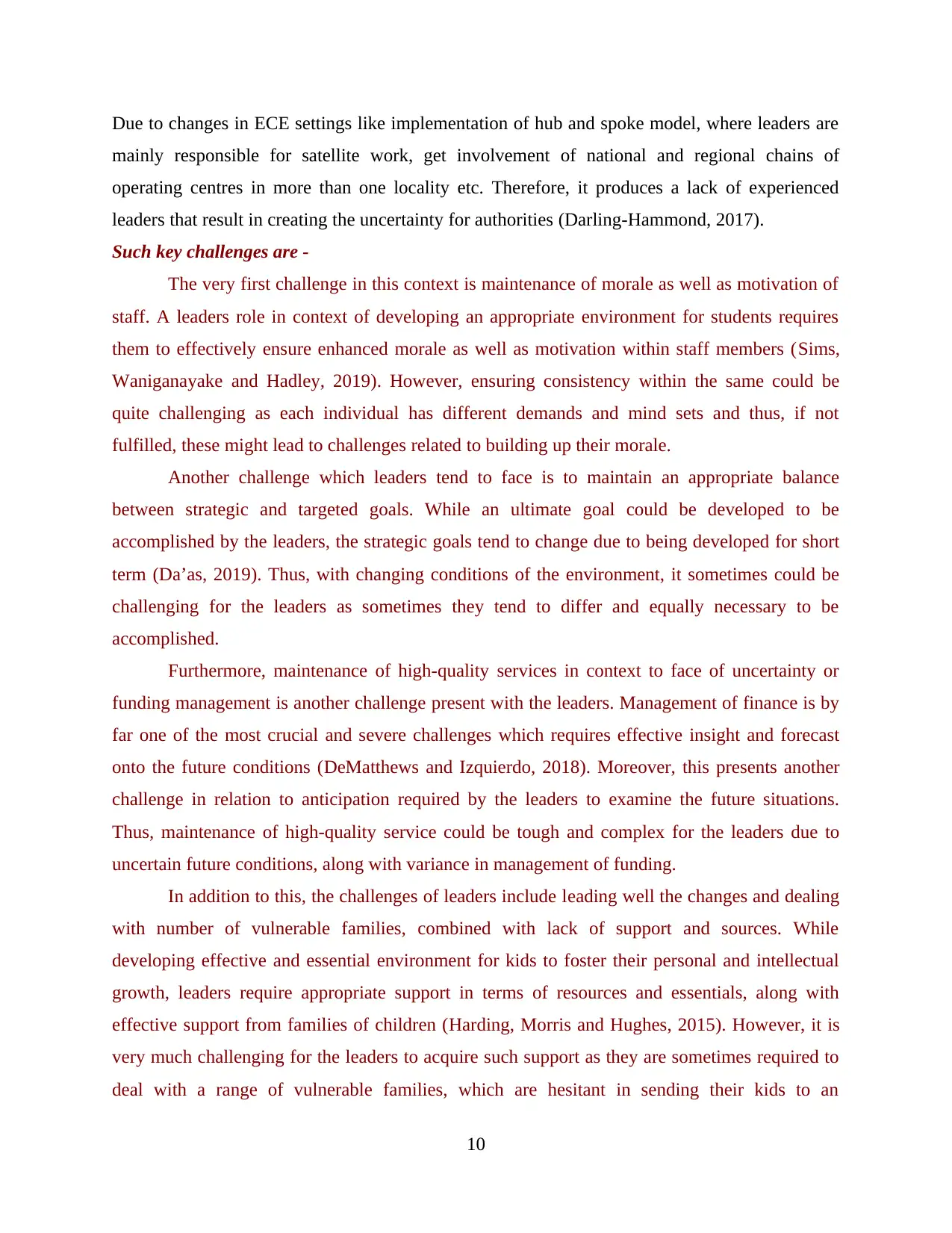
Due to changes in ECE settings like implementation of hub and spoke model, where leaders are
mainly responsible for satellite work, get involvement of national and regional chains of
operating centres in more than one locality etc. Therefore, it produces a lack of experienced
leaders that result in creating the uncertainty for authorities (Darling-Hammond, 2017).
Such key challenges are -
The very first challenge in this context is maintenance of morale as well as motivation of
staff. A leaders role in context of developing an appropriate environment for students requires
them to effectively ensure enhanced morale as well as motivation within staff members (Sims,
Waniganayake and Hadley, 2019). However, ensuring consistency within the same could be
quite challenging as each individual has different demands and mind sets and thus, if not
fulfilled, these might lead to challenges related to building up their morale.
Another challenge which leaders tend to face is to maintain an appropriate balance
between strategic and targeted goals. While an ultimate goal could be developed to be
accomplished by the leaders, the strategic goals tend to change due to being developed for short
term (Da’as, 2019). Thus, with changing conditions of the environment, it sometimes could be
challenging for the leaders as sometimes they tend to differ and equally necessary to be
accomplished.
Furthermore, maintenance of high-quality services in context to face of uncertainty or
funding management is another challenge present with the leaders. Management of finance is by
far one of the most crucial and severe challenges which requires effective insight and forecast
onto the future conditions (DeMatthews and Izquierdo, 2018). Moreover, this presents another
challenge in relation to anticipation required by the leaders to examine the future situations.
Thus, maintenance of high-quality service could be tough and complex for the leaders due to
uncertain future conditions, along with variance in management of funding.
In addition to this, the challenges of leaders include leading well the changes and dealing
with number of vulnerable families, combined with lack of support and sources. While
developing effective and essential environment for kids to foster their personal and intellectual
growth, leaders require appropriate support in terms of resources and essentials, along with
effective support from families of children (Harding, Morris and Hughes, 2015). However, it is
very much challenging for the leaders to acquire such support as they are sometimes required to
deal with a range of vulnerable families, which are hesitant in sending their kids to an
10
mainly responsible for satellite work, get involvement of national and regional chains of
operating centres in more than one locality etc. Therefore, it produces a lack of experienced
leaders that result in creating the uncertainty for authorities (Darling-Hammond, 2017).
Such key challenges are -
The very first challenge in this context is maintenance of morale as well as motivation of
staff. A leaders role in context of developing an appropriate environment for students requires
them to effectively ensure enhanced morale as well as motivation within staff members (Sims,
Waniganayake and Hadley, 2019). However, ensuring consistency within the same could be
quite challenging as each individual has different demands and mind sets and thus, if not
fulfilled, these might lead to challenges related to building up their morale.
Another challenge which leaders tend to face is to maintain an appropriate balance
between strategic and targeted goals. While an ultimate goal could be developed to be
accomplished by the leaders, the strategic goals tend to change due to being developed for short
term (Da’as, 2019). Thus, with changing conditions of the environment, it sometimes could be
challenging for the leaders as sometimes they tend to differ and equally necessary to be
accomplished.
Furthermore, maintenance of high-quality services in context to face of uncertainty or
funding management is another challenge present with the leaders. Management of finance is by
far one of the most crucial and severe challenges which requires effective insight and forecast
onto the future conditions (DeMatthews and Izquierdo, 2018). Moreover, this presents another
challenge in relation to anticipation required by the leaders to examine the future situations.
Thus, maintenance of high-quality service could be tough and complex for the leaders due to
uncertain future conditions, along with variance in management of funding.
In addition to this, the challenges of leaders include leading well the changes and dealing
with number of vulnerable families, combined with lack of support and sources. While
developing effective and essential environment for kids to foster their personal and intellectual
growth, leaders require appropriate support in terms of resources and essentials, along with
effective support from families of children (Harding, Morris and Hughes, 2015). However, it is
very much challenging for the leaders to acquire such support as they are sometimes required to
deal with a range of vulnerable families, which are hesitant in sending their kids to an
10
⊘ This is a preview!⊘
Do you want full access?
Subscribe today to unlock all pages.

Trusted by 1+ million students worldwide
1 out of 19
Related Documents
Your All-in-One AI-Powered Toolkit for Academic Success.
+13062052269
info@desklib.com
Available 24*7 on WhatsApp / Email
![[object Object]](/_next/static/media/star-bottom.7253800d.svg)
Unlock your academic potential
Copyright © 2020–2026 A2Z Services. All Rights Reserved. Developed and managed by ZUCOL.





